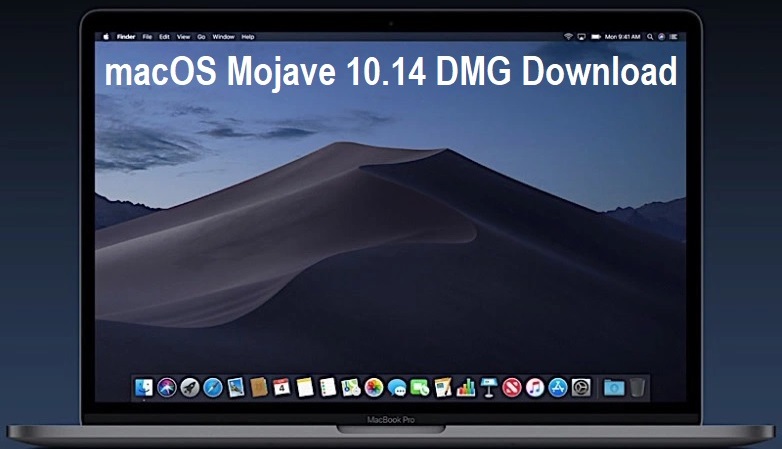Microsoft AutoUpdate (MAU) version 3.18 and later includes the msupdate command-line tool. The msupdate tool can be used to start the update process for Microsoft applications produced for Mac, such as Office. The tool is primarily designed to give IT administrators more precise control over when updates are applied. You can download the latest version of MAU from this link.
The latest: macOS Mojave 10.14.6 supplemental update now available. On August 1, 2019, Apple released a supplemental update of macOS Mojave 10.14.6. According to Apple, this update includes a fix. If your Mac is using an earlier version of any Mac operating system, you should install the latest Apple software updates, which can include important security updates and updates for the apps that are installed by macOS, such as Safari, Books, Messages, Mail, Music, Calendar, and Photos. A Complete Guide on How to install Mac OS Mojave Final 10. 14 on Any Windows PC without using Mac and this method is working and completely tested. This is a step by step guide on How to Install macOS on PC without Mac.I hope this guide will be helpful. If you have any questions or suggestions please leave a comment.

msupdate works by sending Apple Events to the MAU daemon. On macOS 10.14 Mojave and later, you may see a privacy prompt when running msupdate for the first time. If you are using an enterprise management tool such as Jamf Pro, you should deploy a Privacy Preferences Policy Control (PPPC) payload to pre-approve access. Samples of such a payload can be downloaded from GitHub.
Use the following steps to start using the tool:
- Open the Terminal application
- Enter
cd /Library/Application Support/Microsoft/MAU2.0/Microsoft AutoUpdate.app/Contents/MacOS - Run
./msupdate --help
10.14 Mac Update Download
The following options are displayed:
Examples of how to use msupdate


- Display the current configuration parameters for MAU:
./msupdate --config - Display the current configuration parameters in machine-readable format:
./msupdate --config --format plist - List all available updates:
./msupdate --list - Download and install all available updates:
./msupdate --install - Download and install the latest updates for Word, Excel, and PowerPoint:
./msupdate --install --apps MSWD2019 XCEL2019 PPT32019 - Download and install a version-specific update for Outlook:
./msupdate --install --apps OPIM2019 --version 16.17.180090901 - Download and install latest available updates for Excel, wait for 180 seconds (3 minutes) before closing Excel, and display 'Excel will close in 3 minutes to install updates.' on macOS banner notification to notify user:
./msupdate --install --apps XCEL2019 -t 180 -m 'Excel will close in 3 minutes to install updates.'
Note
To use the -t and -m modifiers, you must be using Microsoft AutoUpdate 4.24 or later.
Application identifiers
The following table lists the Microsoft applications for Mac supported by MAU. The identifier is used when specifying the --apps parameter. When specifying multiple applications on the command-line, separate identifiers with a space.

| Application | Identifier |
|---|---|
| Word | MSWD2019 |
| Excel | XCEL2019 |
| PowerPoint | PPT32019 |
| Outlook | OPIM2019 |
| OneNote | ONMC2019 |
| MAU | MSau04 |
| OneDrive | ONDR18 |
| Teams | TEAM01 |
| Skype for Business | MSFB16 |
| Remote Desktop | MSRD10 |
| Intune Company Portal | IMCP01 |
| Defender ATP | WDAV00 |
| Edge Canary | EDCN01 |
| Edge Dev | EDDV01 |
| Edge Beta | EDBT01 |
| Edge Stable | EDGE01 |
Note
- The identifiers for the Office apps, such as Word and Outlook, can be used for Office for Mac (from an Office 365 or Microsoft 365 subscription plan) or for Office 2019 for Mac (either a retail or a volume licensed version).
- If an update is pending for MAU itself, that update must be applied before any applications can be updated.
- Identifiers are not case-sensitive when run interactively from the command-line, but use the character casing in the table when running from a management tool such as Jamf Pro.
- Microsoft Teams might use MAU to provide updates in some scenarios, such as if the Teams updater fails. But, you can't use msupdate to have MAU manage updates for Teams, because Teams doesn't provide admins the ability to deploy and manage updates. Instead, Teams is updated automatically approximately every two weeks with new features and quality updates. For more information, see Teams update process.
10.14 Mac Upgrade
Related articles
